Duncan MacDonald
Jakarta 10 January 2015
Malnutrition in Indonesia
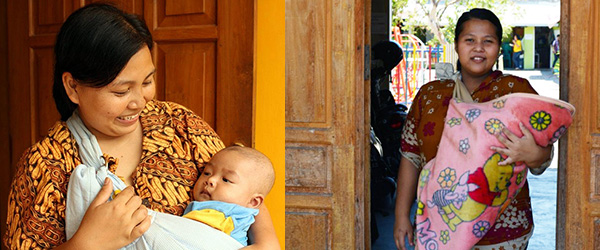 Malnutrition problems in children under five are directly related to their diet since birth. [ 1 ] Numerous cases of infant malnutrition are being reported in Indonesia. We investigate what can be done to alleviate this serious problem.
Malnutrition problems in children under five are directly related to their diet since birth. [ 1 ] Numerous cases of infant malnutrition are being reported in Indonesia. We investigate what can be done to alleviate this serious problem. Education of mothers is important according to Indonesia Ministry of Health. In 2004 there were approx. 1,500 cases of severe malnutrition in West Nusa Tenggara (NTB), while in the neighboring province of East Nusa Tenggara (NTT) the number of children with nutrition deficiencies was quoted as 62,444.[ 2 ] Since the issue had been highlighted by the media, widespread poverty has been reported in East Kalimantan - (328,597 people out of 2.7 million live below the poverty line[ 3 ] and cases of Marasmus (carbohydrate deficiency) have been reported in Jakarta.[ 4 ]
What should babies be fed ?
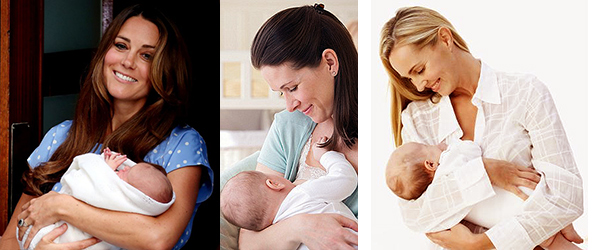 Kate, Dutchess of Cambridge breastfed Prince George Alexander Louis, just like many other Moms.
Kate, Dutchess of Cambridge breastfed Prince George Alexander Louis, just like many other Moms.Doctors agree that breast feeding is by far the best method of feeding infants. Babies need breast milk from birth to 6 months of age. Ideally your baby should be fed up to 18 months.
World Heath Organisation (WHO) list the following choices, in order of preference, for feeding your baby;
1) A mother breastfeeding her own baby
2) A mother's own milk expressed (squeezing milk out of your own breast) and given to the baby in some way
3) Another woman wet-nursing the baby
4) Baby formula or artificial baby milk
Mother's breast milk is free from contamination and supplies nutrients to the infant in the correct and proportion. It meets the baby's needs for the first 6 months, providing the mother is eating a healthy diet. Since 2001, WHO guidelines have stated that babies should be exclusively breastfed until they are 6 months old - something most mothers are physically able to do. Every extra month brings greater benefits to the child.
In 2009, Indonesia enacted a law calling for every baby to be breastfed, or to be given breast milk from donors and milk banks exclusively for the first six months of life, unless there are medical reasons not to do so.
Yet although rates for exclusive breastfeeding in babies younger than 6 months increased from 32% in 2007 to 42% in 2012, according to the 2012 Indonesia Demographic Health Survey, health experts in Indonesia say implementation of the law remains poor and that formula companies continue to push breast-milk substitutes to mothers of very young infants.
The case for breast feeding is solid: "Evidence shows that thanks to protective antibodies, lipids and other elements in breast milk, breast fed babies have fewer episodes of middle-ear infection, diarrhoea and pneumonia. Moreover, the preparation of formula milk in unhygienic conditions that are common in poor countries can lead to diarrhoea or other illnesses", says Marti Van Liere, maternal and child nutrition expert at GAIN Alliance. "Since formula milk is expensive, some mothers water it down and, thus, give their babies milk that is not nutritious enough" she adds.[ 5 ]
Breast milk contains natural antibodies and protects against intestinal and respiratory infections, plus reducing the risk of allergies developing. Breast fed babies are less likely to become overweight as adults. If a newborn does not take breast milk, then the milk from the breast can be expressed and fed to the baby.
If the baby cannot take breast milk or there is some problem in breast feeding, then fortified formula milk can be given. When milk formulas are made up correctly, they are as digestible and in many cases as nutritious as breast milk, but do not contain the protective antibodies.
A newborn baby needs breast feeding 8 to 12 times a day i.e. every 2 to 4 hours. The number of feedings will decrease as the baby gets older. By age 4 months the baby can be fed 4 to 6 times a day. At each feeding the child consumes increased quantity as their needs grow.
How good is baby formula?
 According to the Food & Drug Administration (FDA) paediatrician researchers at Abbott Laboratories, (Abbott controls approx 50% of the USA baby formula market valued at over US$1 billion/year) state "It is increasingly apparent that infant formula can never duplicate human milk. Human milk contains living cells, hormones, active enzymes, immunologists and compounds with unique structures that cannot be replicated in infant formula."[ 6 ]
According to the Food & Drug Administration (FDA) paediatrician researchers at Abbott Laboratories, (Abbott controls approx 50% of the USA baby formula market valued at over US$1 billion/year) state "It is increasingly apparent that infant formula can never duplicate human milk. Human milk contains living cells, hormones, active enzymes, immunologists and compounds with unique structures that cannot be replicated in infant formula."[ 6 ] The Texas Department of Health's Bureau of Nutrition Services says that artificially fed infants in the United States are three to four times more likely to suffer from diarrheal diseases (the number-one killer of infants world-wide), four times more likely to suffer from meningitis and have an 80% increase in the risk of lower respiratory infections.[ 7 ]
Tips on using Baby Formula If you must use baby formula, be aware there are different types available. Some are made from cow's milk or soy milk. Some formulas have little iron - or none at all. Formula is sold in several forms;
• Ready-to-use This is the most expensive kind, but no mixing is necessary
• Concentrated Liquid This is less expensive. You mix the formula liquid with an equal part of water
• Powder The least expensive. You mix one level scoop of powder with 2 ounces of water and stir well
Does breastfeeding increase my baby's IQ?
 Researchers have demonstrated that,even after adjusting for socioeconomic differences among parents, children who were not breastfed as infants experience significantly lower test scores on several measures of cognitive ability, including the Denver Development Screening Test, and the Bayley Mental Development Index.
Researchers have demonstrated that,even after adjusting for socioeconomic differences among parents, children who were not breastfed as infants experience significantly lower test scores on several measures of cognitive ability, including the Denver Development Screening Test, and the Bayley Mental Development Index. One 1994 study reported in Development Medicine & Child Neurology showed some aspects of intellectual attainment at 5 and 10 years of age, to be inferior among children who were formula-fed compared with those who were exclusively breastfed for at least three months.
In another 1988 study, test scores were directly correlated with duration of breastfeeding; the more months a child was breastfed, the higher she scored on the test.[ 8 ]
Sudden Infant Death Syndrome The USA Centers for Disease Control & Prevention (CDC) Morbidity and Mortality Weekly Review, reported in 1996 that lack of breastfeeding, along with exposure to tobacco smoke and a prone sleeping position, are now recognised as the only known modified risk factors for SIDS.
When should baby be introduced to solids?
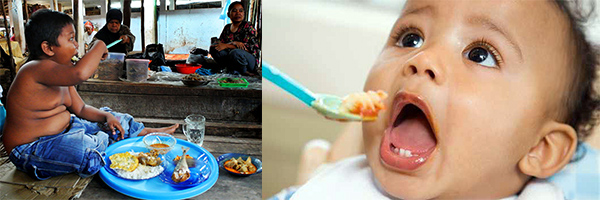 By about 4 - 6 months a baby can digest increasingly complex foods and you can gradually introduce solids into their diet. However ideally, your baby should continue to receive breast milk or formula throughout the first year of life.[ 9 ] Your baby is ready for solids when it has good control of its head and neck. If your baby wakes up during the night, or is looking for more food after being breastfed, you should start solids.
By about 4 - 6 months a baby can digest increasingly complex foods and you can gradually introduce solids into their diet. However ideally, your baby should continue to receive breast milk or formula throughout the first year of life.[ 9 ] Your baby is ready for solids when it has good control of its head and neck. If your baby wakes up during the night, or is looking for more food after being breastfed, you should start solids. Foods that can be given to your baby when it reaches 4 to 6 months of age, are; iron-fortified baby cereals, raw plantain powder cooked in milk, semolina, mashed fruits (apple,pear, banana or avocado), and mashed vegetables (pumpkin, potato, carrot or zucchini).
At first, start with cereals of a soft smooth texture, mixed with breast milk or formula milk to a thin consistency. When your baby learns to control it in its mouth, the cereal may be mixed to a thicker consistency.
Feeding practices to avoid
• never put the bottle in bed
• do not prop the bottle up while feeding
• don't feed your baby honey
• don't use a low-iron formula
• never give cereals in a bottle
Best practices for a healthy baby
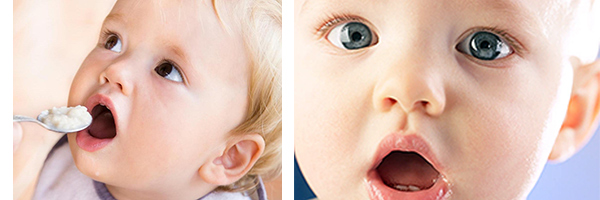 ◊ Start feeding solids slowly with 1/2 to one teaspoon at a time. Increase the amount gradually.
◊ Start feeding solids slowly with 1/2 to one teaspoon at a time. Increase the amount gradually. ◊ After first four weeks, continue to offer your baby a variety of bland fruit and vegetables, gradually increasing the amount until you are up to 1/2 cup of solids (approx 120g) per solid meal.
◊ Start first with a single food and watch for 4 - 5 days for any food allergies.
◊ No meat, chicken or fish before 6 months
* No eggs before 8 months
* No cows milk before 12 months.
◊ At five months your baby's weight should double the birth weight.
Diet for pre-school children
 Between the age of 1 and 5 years your child continues to grow and develop in four important areas: (i) Movement and coordination (ii) Vision and manipulative skills (iii) Hearing and speech (iv) Play and social skills.
Between the age of 1 and 5 years your child continues to grow and develop in four important areas: (i) Movement and coordination (ii) Vision and manipulative skills (iii) Hearing and speech (iv) Play and social skills. During the pre-school years children are growing rapidly, developing complex skills and need high energy food that is rich in nutrients, vitamins and minerals. Their diet should include plenty of calcium-rich food such as milk, cheese and yogurt to build strong bones and teeth.
Pre-school children should eat plenty of fruit and vegetables as these provide vital vitamins and minerals. Children who eat a balanced diet should not need vitamin or mineral supplements, but liquid drops of vitamin A, C and D can be given to those who eat a poor diet.
Although iron- deficiency anaemia is common, you should consult your doctor before giving your child iron supplements. Note: In many cases the mother may be anaemic and need this supplement. >>see our earlier article 'Anaemia & Iron Deficiency'
Diet for school-age children Weight may double during adolescence due to increase in height, muscle development and fat deposition. During puberty teenagers require more calories in proportion to their body weight than at any other period of their lives - apart from infancy. Never use food, especially food high in fat or sugar as a reward. It will increase the child's preference for that food and make them less likely to accept more nutritious foods.[ 10 ]
Indonesian Medical Association's Study on Breastfeeding [ 11 ]
 This study states the practice of giving prelacteal (i.e. before milk) feeding or early supplementary food was encouraged by traditional birth attendants - mid-wives. Studies in Lombok and East Java show mothers give complementary food in the first week of infancy, while in Madura solid food has been introduced since two weeks of age.
This study states the practice of giving prelacteal (i.e. before milk) feeding or early supplementary food was encouraged by traditional birth attendants - mid-wives. Studies in Lombok and East Java show mothers give complementary food in the first week of infancy, while in Madura solid food has been introduced since two weeks of age.A study in Pangkep Subdistrict, South Sulawesi showed only 23% of mothers exclusively breastfed their babies.
It is well known in medical circles that prelacteal feeding contributes to growth retardation. Most mothers used water and honey while some gave banana juice to their babies before breastfeeding. This is dangerous due to infection problems as the food could contain bacteria, causing intestinal infection.
Due to the delay in commencing breastfeeding because the mothers were separated from their babies, many children did not receive colostrum (milk secreted by a mammal just before and for a short time after giving birth, containing antibodies to protect the offspring against disease).[ 12 ]
Health-workers and mid-wives, should focus on explaining the benefits of early breastfeeding. Mothers should be kept close to their babies after birth and breastfeed their baby within the first hour.
Exclusive breastfeeding until six months of age is recommended. However the condition of the mother should be strong enough to produce breast milk in adequate amounts. The data in the Indonesian Medical Association on Breastfeeding, showed the overall status of mothers was good enough (only 11% had an arm circumference below 23.5 cm) and the volume of breast milk should be adequate.
CONCLUSION:
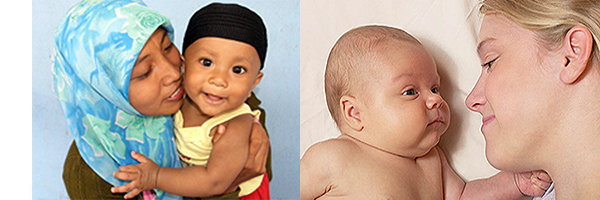
Infant malnutrition is caused through a combination of:
1. Poverty - where the mother is either malnourished herself and cannot produce sufficient breast milk and/or the family is unable to purchase suitable food for the child.
2. Poor education of mothers on how to properly feed their baby.
3. Traditional birth attendants who are giving incorrect information to mothers including:
- ◊ Separating mother and baby and delaying the first breast feeding for up to 2 days when it should be done within 2 hours. Up to 60% of mothers did not breast feed their baby until the second day and 41% after the second day.
- ◊ The early introduction of solid foods - as early as one week - when it ideally should be at 6 months.
- ◊ Prelacteal feeding (feeding solids before breast or formula feeding, instead of after) which leads to mental and physical retardation. The prelacteal foods most provided to the children were water (48%) and honey (33%). In any case honey should not be introduced before 12 months of age.
- ◊ Recommending feeding newborn babies only 4 times a day, when ideally they should be fed 10-12 times a day.[ 13 ]
Of children aged 6 to 8 months, only 25% ate vegetable every day and only 11% ate it 3-5 times a week. Most children were only provided fruit 1-2 times a month.
World Health Organisation (WHO) recommends babies be breast fed for at least 2 years.
Malnutrition in children in Indonesia can be greatly reduced by educating mothers on Breastfeeding - an option available to 90 - 95% of new mothers ~ which remains the safest, least expensive and most healthy choice in infant feeding.
This Digest article can be downloaded as a FREE e-book on Smashwords.
Available on iPad / iBooks, Kindle, Nook, Sony, & most e-reading apps including Stanza & Aldiko.
Just click the following link
>> download free e-book dMAC Digest Vol 5 No 4




